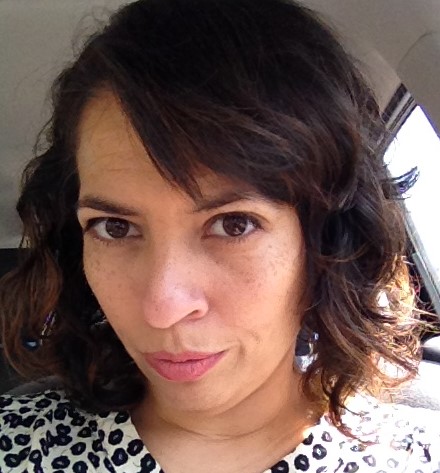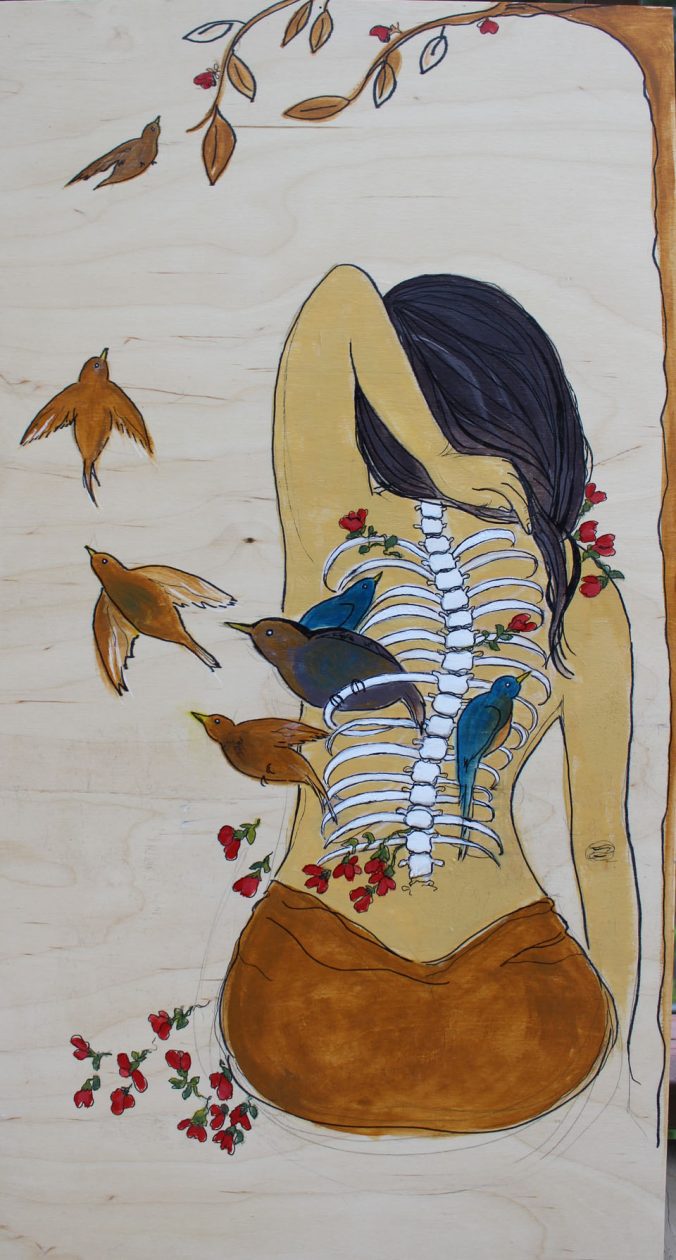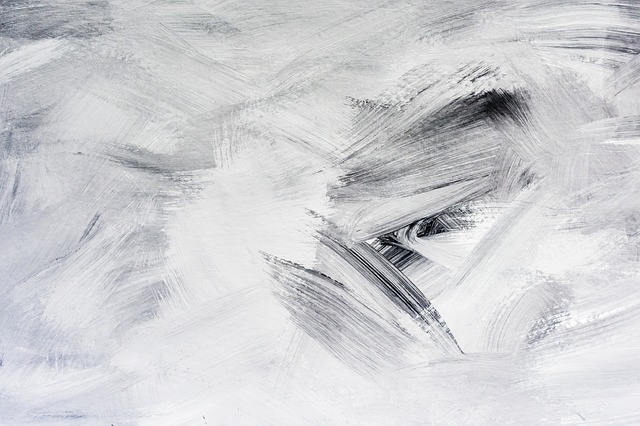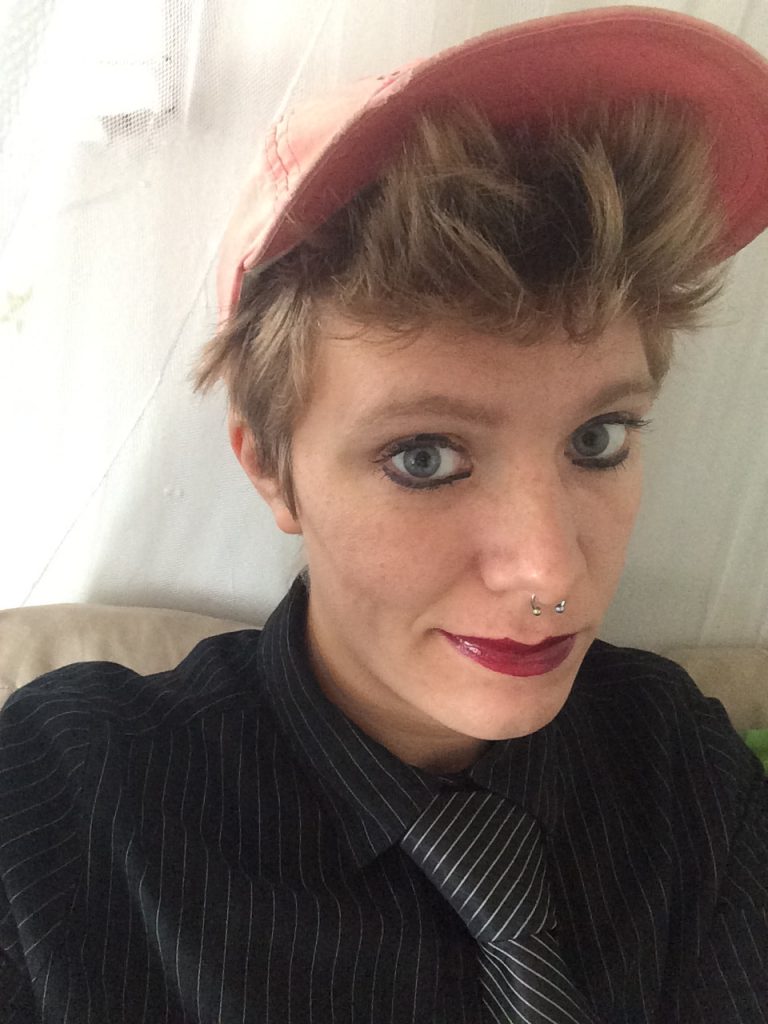At night, I go into the backyard. I like being out there alone. The sounds of shrill, resentful voices from inside the house, as well as the loud clap of my loneliness becomes a dull din when I’m alone in the dark.
I feel the cold air on the back of my neck and hair. I turn on the workshop lamp and take out my journal. This isn’t a good time in my life. I’m twenty-three, and I can’t wait to escape into my thirties and forties. I want to speed up time.
I’ve been in therapy for about two years. I’m aware that I have a lot of work ahead of me before I begin feeling even slightly normal. Healing only happens with time.
On the other side of the wooden fence, I see a man leaning in to watch me. He reaches over the fence. He’s a stocky, leather-faced immigrant, wearing a light brown shirt. His hand, as he grasps is blunt and thick. He looks like my father’s brothers. I turn quickly to get a better look, but he isn’t there. He lives in the corner of my eye, as do all the rest of these men I see.
I’m twenty-five years of age. I’m walking down the hall of the school where I teach 5th grade. I feel the presence of another person coming towards me. Out of the corner of my eye I see a small statured man—hefty but diminutive—walk alongside in the opposite direction. He’s wearing bleary toned pants—grey or brown—and a red shirt. I register the shapes and colors before he passes me and disappears out of the corner of my eye.
Sometimes I see people I know aren’t there. This has been happening since I went into therapy four years ago and I unhooked the memories from their anchors.
Memories float. No matter what you do, whoever you were fifteen years ago can float to the surface to haunt you. It doesn’t matter if you are ready or if you are walking back to your classroom.
I take a deep breath and decide to ignore the man I just saw. I’m shaken. I take a deep breath and tell myself it is okay. It’s not, of course. But I’m very good at rearranging realities to match my needs. It’s a trick I learned from my tumultuous childhood.
At this school, I am working with the children from my neighborhood and it’s breaking me. I see children going through the same abuses I did. This time, it’s my responsibility to protect them and this terrifies me as much now as it did when I was a child.
I’m not delusional. I go through an exacting process.
Do I like what I see/feel/know?
No.
Is there anything I can do about it?
No.
Okay, let’s change our attitude to cope.
Okay, but this doesn’t feel good.
Noted.
I don’t talk to my psychiatrist about the people I see. I know she’ll heavily medicate me. I strongly suspect this is posttraumatic stress disorder. The problem with PTSD is that it prefers to unsettle you as you feel you are moving beyond those memories. When you feel strong, the memories appear, waiting for resolution.
Instead, I go to my therapist. The words spill out of my mouth with trepidation.
“Is it men?” she asks.
“Yes. How did you know?” I say.
“It’s out of the corner of your eye?” she says.
“Yes.”
“Do they look like the men who hurt you?”
“Yes,” I say.
“That’s common with people who have had sexual abuse. I’m sorry,” she says.
“I’m not crazy?”
“No,” she says. “You are just healing.”
“Healing feels awful. Why am I doing this to myself? I just want it to stop.”
“Because,” she says, “you want something better for your children.”
“Yes. Yes, I do.”
But for a moment, I think about quitting. Why do they call it healing when it feels like being ripped open?
I didn’t look it up then. The internet was newer and didn’t have the breadth of information it contains now.
At that time, I was not an adept computer user. I wouldn’t have known what to look for. Do I google “symptoms of abuse” or “visions out of peripheral vision”? Or do I just lay in emotional nudity, “Why do I see men who look like the men who abused me? Wasn’t the experience enough?”
Typing up that search on a computer would have been more than I could manage. Writing things brings a new level of reality. It’s no longer in your head. You’ve let out the thoughts to make words and that beast uncurls and begins to evolve. It becomes harder to pretend you don’t see it—that it doesn’t exist.
Writing makes things real. I like where things are. I prefer those images curled up in a tight ball inside my head, floating like all my other thoughts—bits of lint and fluff drifting in a vast tangle of deeper thoughts, beliefs, and memories.
Thoughts and memories of fear, floating amongst the clumsy words of kindness I use to talk to myself.
I’m twenty-six. I’m at my mom’s house in the bedroom that used to be mine. I’m changing clothes after a workout. I reach back to unlatch my bra. As I slide down the straps, I turn my body slightly. I see someone outside my window looking in on me. It’s broad daylight. I’m furious.
I put on a t-shirt and walk into the living room to make a head count. Everyone who is supposed to be there is there. But people walk in and out of my mom’s house like it’s a train station. They stop to chat or rest or use the bathroom.
I look at their faces. They seem calm.
“What’s going on? Why are you making that face?” Dad says.
“It’s fine,” I say. “Was anyone in the backyard just now?”
“Why?” he says, “What happened?”
“Nothing. Nothing.”
The shame of being watched silences me; shame always silences me. I don’t need the men in my family to maintain a tally of how many men have seen me naked. I don’t need them to talk amongst themselves about which of them have seen me naked. I don’t want them to talk about me. I don’t want to be a word bandied in their mouths.
There are multiple entrances into the backyard and I know I heard the clang of the kitchen door. Whoever that was knows I saw them.
I’ve never felt safe in my mom’s house.
My aunt committed suicide when I was twenty-five years old. Her conspiracy theories turned out to be a bit more than we expected. She left a single note to her eldest son:
“Jose, take care of my mother.”
She’s locked dead inside her one bedroom apartment till her sister finds her. All the signs were there. She was a prescription drug addict. She was heavily medicating in order to sleep and make it from one day to the next. She was telling us stories that didn’t make sense. She was missing work and her friends had started to call me to tell me they were worried about her.
In her car, she heard voices. She turned up the car radio so loud, I couldn’t hear my own thoughts. And she couldn’t hear the voices.
She was locked inside her own head, adrift in schizophrenia before anyone even thought to look for her. She must have been unbearably alone, living in this world while the rest of us lived in ours.
But I don’t have schizophrenia. When I gather the courage to speak to my psychiatrist, she tells me I’m fine.
“How do you know that?” I say.
“Because you are asking me. People that have schizophrenia don’t ask. They don’t ever doubt what they are seeing,” she says.
Her office is filled with stuffed animals and incense and Buddhas. I look down at her thumb.
She chews on it when she’s nervous. Today, she’s wrapped a band aid around it to prevent the chewing. Does she know what I’m going through?
I want to pass over this phase of my healing instead of through it. I rage every time I’m at her office. I’m angry. I tell her it’s unfair.
That dull doubt is my saving grace. I know my tía never doubted the voices she heard. They were part of her reality. No second thought. My wondering is that fine line between us—her and me.
While the doubt fills me with uncertainty, I’m grateful for it.
The flashbacks continue for about five more years. Those years feel like decades. Then the healing process shifts and instead of experiencing images as part of the PTSD, it becomes a lot scarier. I’m in a safe place. I’m happily married. I’m far from my family. Most of them don’t know where I live. I’ve stopped talking to most of them. Instead, those relatives become foggy memories in my mind. Once the flashbacks ease up, I begin to remember happier things. I remember gathering around my mom’s kitchen table, talking with the other women. When I remember this, I don’t remember their death pacts or their depression; instead I remember the comfort and warmth of their presence—the predicable affection that surrounded me.
At the same time this is happening, my brain has decided it’s time for the next phase of healing. I stop seeing flashbacks in the form of images. Suddenly, I’m hit with the emotions. I feel someone hovering over my bed and pressing me down, and I’m terrified.
“I’m so frightened,” I tell my husband. “Please hold me and tell me that everything is going to be okay?”
“What’s scaring you?” he says.
“I don’t know,” I say. “Please hold me.”
But I do know. The memory is non-specific and barely an image. It’s more like a sensation. But I know where it comes from. I’m a child and I’m being stalked. I’m afraid and terrified. I feel like a small animal, and I know he’s going to get me. He will devour me, and I will be gone. Erased.
One time too many as a child, I had to pretend I wasn’t scared, wasn’t anxious, wasn’t angry. I denied all the emotions. And now, all those feelings are crawling back expecting to be seen, to be noticed, to be called by name. They want to come out of hiding.
In the warmth of my husband’s arms, I talk to myself.
“You are safe. Everything is okay,” I tell myself.
I’ve gotten better at speaking to myself with kindness. When my emotions are settled, I pick them apart slowly. I honor them for what they are and hope that they forgive me.
“That is fear,” I say.
“That is anxiety. This emotion is temporary. I can feel it without being swallowed. I’m okay.”
“That is loathing. But I don’t need to hate myself. I did the best I could with what I had. I had good instincts and here I am on the other side. It’s okay,” I tell myself, “I am safe and no one is going to hurt me. I have many more resources now. I know how to take care of myself.”
I soothe the feelings till they are quiet. I rock them to sleep like babies. Feelings don’t have any logic. They are there to be accepted. Just like children. When my own children are not okay, I hold them and love them and reassure them. Here I am doing the same for myself—and hoping I can teach myself how to love myself better.
I compel the hidden men at the corner of my eye to never return. I stare at my life straight on.
 Mireya S. Vela is a creative non-fiction writer and researcher in Los Angeles. In her work, Ms. Vela addresses the needs of immigrant Mexican families and the disparities they face every day. She tackles issues of inequity and how ingrained societal systems support the (ongoing) injustice that contributes to continuing poverty and abuse. Ms. Vela received her Bachelor’s degree in English from Whitter College—and received her Master of Fine Arts from Antioch University in 2018. She is also a visual artist.
Mireya S. Vela is a creative non-fiction writer and researcher in Los Angeles. In her work, Ms. Vela addresses the needs of immigrant Mexican families and the disparities they face every day. She tackles issues of inequity and how ingrained societal systems support the (ongoing) injustice that contributes to continuing poverty and abuse. Ms. Vela received her Bachelor’s degree in English from Whitter College—and received her Master of Fine Arts from Antioch University in 2018. She is also a visual artist.
Twitter: @mireyasvela
Instagram: mireyasvela
Visual Art website: mireyavela.com



 Laur A. Freymiller is an Oakland-based writer originally from the heart of the Midwest. Her short stories have been published in The Manuscript, Entropy Magazine, Defiant Scribe, Z Publishing House’s Minnesota Emerging Writer collection, and have received honorable mention in GlimmerTrain competitions. She lives with her perfect cat, Scout.
Laur A. Freymiller is an Oakland-based writer originally from the heart of the Midwest. Her short stories have been published in The Manuscript, Entropy Magazine, Defiant Scribe, Z Publishing House’s Minnesota Emerging Writer collection, and have received honorable mention in GlimmerTrain competitions. She lives with her perfect cat, Scout.